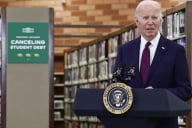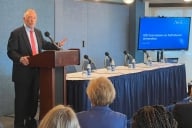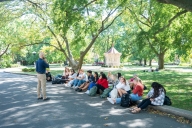You have /5 articles left.
Sign up for a free account or log in.
The days leading up to Easter were challenging ones at the College of the Holy Cross.
The Fenwick Review, a conservative student newspaper at the college, published an article about the writings of Tat-siong Benny Liew, who holds an endowed chair in New Testament studies at the college. The article featured quotes from Liew's writings suggesting that Jesus of Nazareth may, in some New Testament writings, be seen as a feminine figure, and in other writings may be best read as a "drag king." Liew also suggested that Jesus may have had "queer desires." The article noted that Liew regularly teaches courses on the New Testament at the Roman Catholic college and that his colleagues display his books in the departmental bookcase. (Here is the full text of Liew's article, “Queering Closets and Perverting Desires.”)
Roman Catholic colleges with some regularity are criticized for faculty members whose views don't align with traditional church teachings -- and Catholic colleges have consistently said that their mission involves employing scholars who hold a variety of views. Many times, these disputes come and go in a day. But the controversy over Liew grew all last week, in part because of what he teaches. Further, while the quotes cited in the student newspaper article were all years old, the student article appeared at the beginning of Holy Week, the week prior to Easter.
More than 14,000 people quickly signed an online petition demanding that Holy Cross dismiss Liew because of his "vilest claims" about Jesus.
Liew did not respond to an email seeking comment on the controversy.
The college issued two statements about the situation.
The institutional statement said, "The decade-old work referenced in the Fenwick Review article was not intended for an undergraduate classroom, nor has it ever been assigned at Holy Cross. It was an intentionally provocative work, not a statement of belief, meant to foster discussion among a small group of Biblical scholars exploring marginalization. No one has made a complaint about the content of Professor Liew’s classes in his four years at Holy Cross."
The second statement was from the Reverend Philip L. Boroughs, the president at Holy Cross, who noted Liew's academic freedom.
"I know Professor Liew to be a dedicated teacher and an engaged scholar," said Father Boroughs. "He is a man of faith, and he and his family are active members of a church community. Academic freedom is one of the hallmarks of a liberal arts education. Scholars in all disciplines are free to inquire, critique, comment, and push boundaries on widely accepted thought. However, I strongly disagree with the interpretation of John's Gospel, as described in the Fenwick Review, and I find it especially offensive in this most sacred of all weeks in the liturgical calendar."
The conflict escalated on Friday, when the Reverend Robert J. McManus, bishop of Worcester, Mass., published a statement on Liew in the local Catholic newspaper. The statement didn't just criticize Liew, but also questioned the way Father Boroughs invoked academic freedom.
Of Liew, Bishop McManus wrote that his writings "cast doubts on the male sexuality of Jesus Christ based on Professor Liew’s seriously flawed analysis of some texts of the Gospel of St. John. I am deeply troubled and concerned to hear that someone who holds an endowed chair in New Testament studies at the College of the Holy Cross has authored such highly offensive and blasphemous notions. Such positions have no place in the biblical scholarship of a professor who teaches at a Catholic college and who, as such, should be supportive of the college’s Catholic identity and mission."
And of Father Boroughs, the bishop wrote, "Academic freedom certainly plays a critical role in the intellectual life of a Catholic institution of higher learning like Holy Cross. However, how that academic freedom is exercised, particularly in the fields of theology or religious studies, cannot provide cover for blatantly unorthodox teaching. Clearly the biblical conclusions that Professor Liew has reached in his writings are both false and perverse."
The bishop added, "Holy Cross has a duty to, at least, ask Professor Liew if he rejects the biblical positions he penned some 10 years ago or if he supports and defends those positions today. If he disavows them, then he must state so publicly, so as not to create confusion about the nature of Christ. If he does not, then it is my duty as the bishop of Worcester to clearly state that such teaching is a danger to the integrity of the Catholic faith and, in prudence, warn the Catholic faithful committed to my pastoral care that such unorthodox teaching has no place in a Catholic college whose mission is to promote and cultivate the Catholic intellectual tradition."
Holy Cross is a Jesuit college and is not controlled by the Worcester diocese that Bishop McManus leads. But generally, Catholic colleges try to avoid public disputes with their local bishops.








